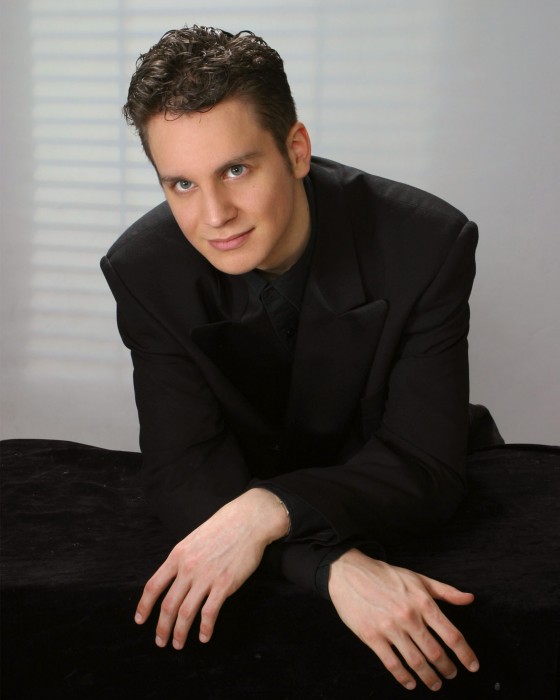Pianist Vnukowski revives music of a neglected composer in impressive Carnegie debut

Daniel Vnukowski performed at Carnegie Hall Friday night.
Daniel Vnukowski brought a strikingly contemporary account of the Chopin Preludes and a revelatory reading of Karol Rathaus’s Piano Sonata No. 3 to the Weill Recital Hall stage Friday night. The event marked the young Polish-Canadian pianist’s Carnegie Hall debut.
Vnukowski selected a trio of demanding works spanning three centuries, which would test the intelligence, expressive abilities, and physical capacity of any keyboard artist. Vnukowski was more than up to the challenge, and his playing grew in depth, daring, and insight as the evening progressed.
The program began with Handel’s Keyboard Suite No. 7 in G minor, HWV 432. No concerns about period niceties here with a shy imitation of the harpsichord’s demure voice and short-lived vibrations. From the opening chords of the Overture, Vnukowski’s vision was bold and commanding, reveling in the expressive dynamics of the Steinway.
The Handel suite showcased the pianist’s easy strength and thoughtful interpretation through six movements concluding with a brilliant Passacaglia, striking in its variety of technical snares and expressive range. This was not a reading for purists, though Vnukowski kept the dynamic range on an even keel, avoiding fluctuations in volume.
The pianist has been a champion of music by mid-20thcentury Jewish composers impacted by Nazi persecution. One of the most striking of these is Karol Rathaus (1895-1954), whose oeuvre ranges from recital and chamber pieces to symphonic works and opera. That Rathaus’s work continues to be largely overlooked is tragic, so credit to Vnukowski for helping to remediate that neglect.
Composed in Berlin in 1927, at the height of the composer’s success in central Europe, the Third Sonata combines harmonic and rhythmic innovation within traditional forms. From the first languid but disturbing chords—a conventional seventh chord in the right hand and a tight knot of discord in the left—Rathaus grabs our attention and won’t let go. The work is singular in its energy, drive, variety of expression.
The music reflects the age’s German expressionism, the time of Nolde and Beckmann in visual art, Fritz Lang and Murnau in film. The diamond-sharp brilliance of Rathaus’s writing is affecting, with an aura of strain and an aching quality carries this work through four movements.
Vnukowski sought not so much to interpret as to reveal. His playing is not openly emotional, but grandly passionate, sweeping flawlessly through euphoric runs with rhapsodic abandon while being precise in phrasing and crisp articulation. Everything felt organic, with meaning and a sense of place.
Rathaus’s sonata closes with a complicated finale. A fugue melts into an andante balancing rapture with restraint. Vnukowski shepherds this peculiar but intriguing progression into a glorious concluding presto with jazz overtones—something like “Fascinating Rhythm” on steroids. This sonata suggests that Rathaus was unique in his time—neither traditionalist nor radical—and a great musical thinker whose work deserves to be heard more frequently today.
The final work on the program was Chopin’s set of 24 Preludes, Opus 28. Vnukowski is not shy about making this collection his own, and indeed he brought a distinctly 21stcentury take on one of the staples of 19thcentury piano literature.
This is big-sounding Chopin, not the whisper-soft style that the composer himself was said to prefer (perhaps because of ill health). Yet, the playing was never over-romanticized. Under Vnukowski’s touch, several of the Preludes—notably No. 22—expressed an almost neurotic frenzy and hysteria. At the same time, the pianist’s approach in the more lyrical, restrained selections—Nos. 11, 13, and 17—were clear and rigorous without succumbing to sentimentality.
While not to everyone’s taste, this assertive, fearlessly virtuosic Chopin style was filled with thoughtful exploration and a kind of questioning illumination. For his insight and daring, no less than his advocacy of a forgotten compatriot composer, Vnukowski is a pianist to watch.
Linda Holt writes about classical music for the Broad Street Review (Philadelphia) and, as L.L. Holt, is the author of two novels about Beethoven (The Black Spaniard and Invictus). She has a doctorate in arts and letters from Drew University and teaches humanities as an adjunct at Southern New Hampshire University and Thomas Edison State University. She is president of the Princeton Research Forum and a member of the Music Critics Association of North America (MCANA).
Posted May 04, 2019 at 6:06 pm by Lev Deych
Dear Ms. Holt, thank you for the wonderful and insightful review of Daniel’s recital, and especially for what you wrote about Karol Rathaus. I am working on a documentary about Rathaus, and as a part of this work initiated a Rathaus festival which took place this February where Daniel played Rathaus’ piano concerto.
Thanks again for the wonderful review.